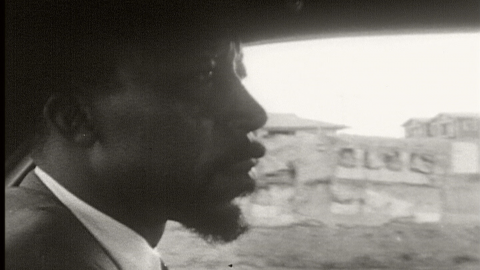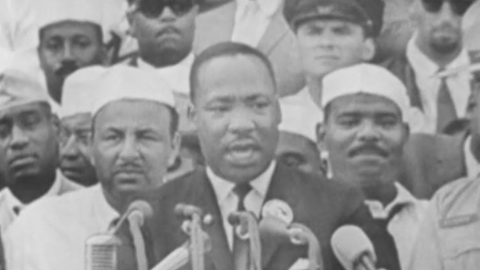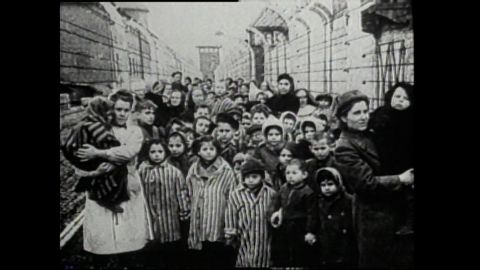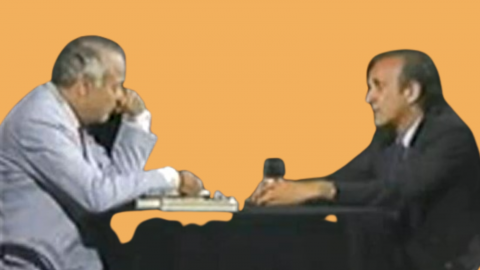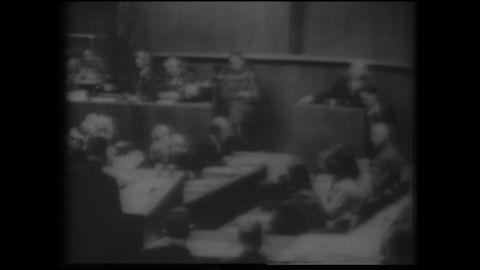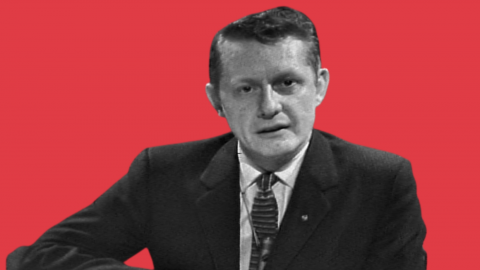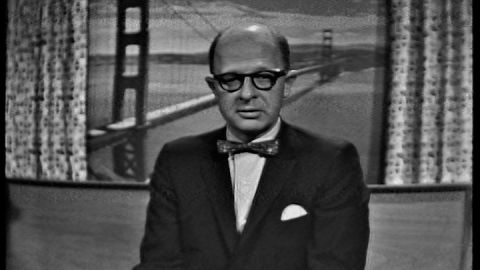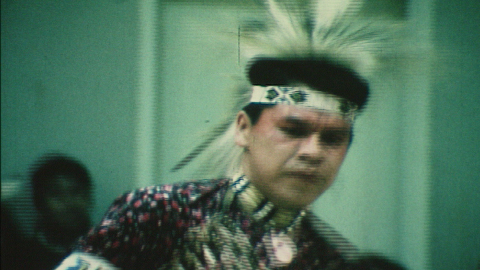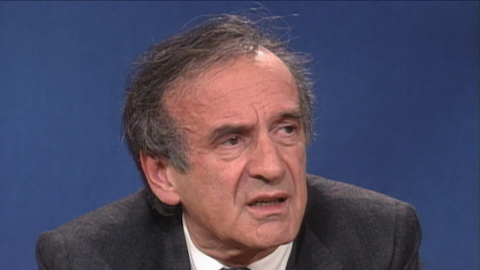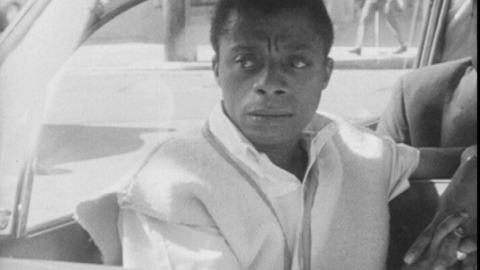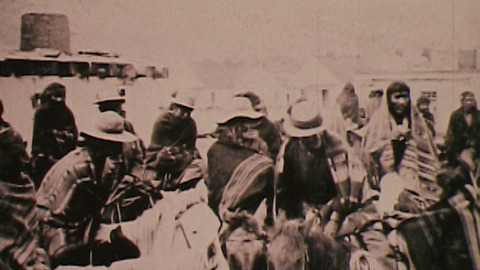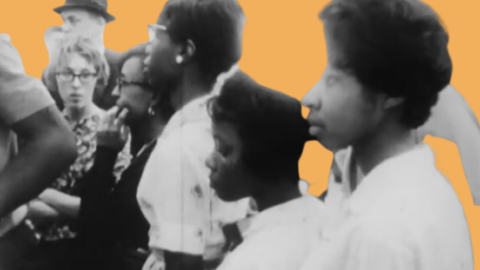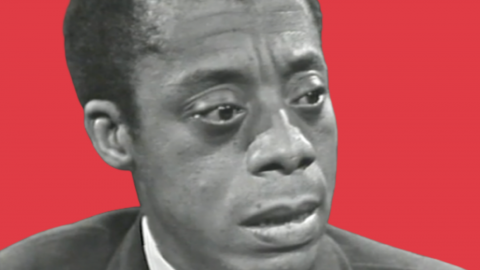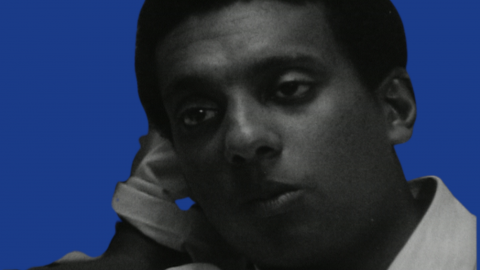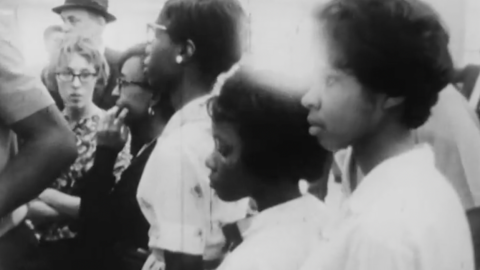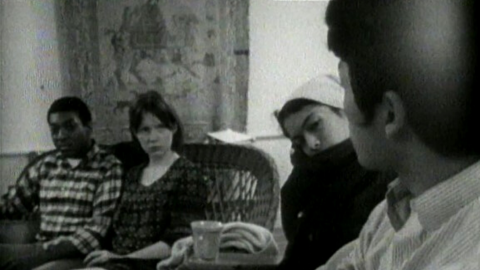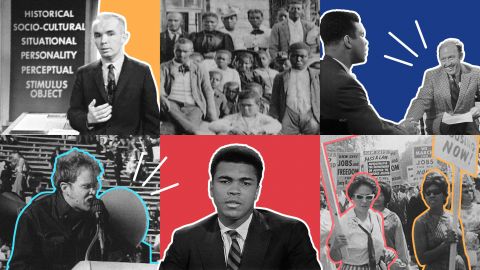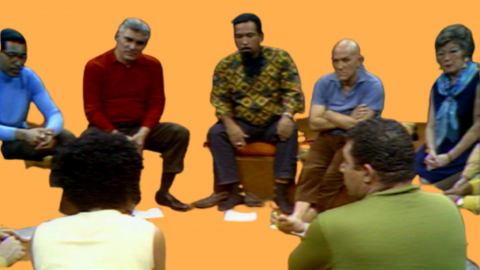[gentle music]
- [Announcer] The following program is from NET,
the National Educational Television network.
[upbeat music]
♪ Oh, the poor folks hate the rich folks ♪
♪ And the rich folks hate the poor folks ♪
♪ All of my folks hate all of your folks ♪
♪ It's American as apple pie ♪
♪ But during National Brotherhood Week ♪
♪ National Brotherhood Week ♪
♪ New Yorkers love the Puerto Ricans, how chic ♪
♪ Step up and shake ♪
♪ Someone's hand ♪
♪ You can tolerate him if you try ♪
♪ Oh the Protestants hate the Catholics ♪
♪ And the Catholics hate the Protestants ♪
♪ And the Hindus hate the Muslims ♪
♪ And everybody hates the Jews ♪
♪ But during National Brotherhood Week ♪
♪ National Brotherhood Week ♪
♪ It's national everyone smile at ♪
♪ One another-hood week ♪
- [Man] We're in a real bad way.
♪ Be nice to people who are ♪
♪ Inferior to you ♪
♪ It's only for a week so have no fear ♪
♪ Be grateful that it doesn't last all year ♪
[audience laughs] [audience applauds]
- [Man] That's great.
- [Narrator] As they first walked into this courtyard
in Gloucester, Massachusetts,
they were convinced that for them,
brotherhood would last forever.
12 college students,
representing the spectrum of middle-class attitudes
of different religions, different races,
from different sections of the country.
Their common bond,
a denial that they are uncommonly prejudiced.
For one week, they are to live together
to test that conviction.
A workshop created by National Educational Television
to determine the degree of prejudice in educated America.
Terry Alexander, Jewish, from Atlanta, Georgia.
Philip Chan from Oceanside, New York, Harvard University.
Sandra Clementine Walker, Radcliffe College,
from Tuskegee Institute, Alabama.
Dennis Feldman, Beverly Hills, California, Harvard,
self-described Jew by birth.
Joelle and Richard Brown, Jews by,
married just a few days before.
Linda Shen, Radcliffe, from Hamden, Connecticut.
Tom Thompson, Catholic, living and attending college
in Providence, Rhode Island.
Carla Halstead, Boston University.
Her father is a Protestant minister here in Gloucester.
Gill Macmillan, Newark, New Jersey,
Brandeis University.
Wayne Grudem, Harvard,
a fundamentalist Baptist from Eau Claire, Wisconsin.
Anne Pepper, Catholic, Boston University.
Hometown, Newton, Connecticut.
Working and living with them, Max Birnbaum,
director of the Boston University
Human Relations Laboratory.
- [Max] My task was to stimulate and encourage
the members of the group to become aware of their attitudes
and feelings, and to express them.
Prejudice in our society has many targets.
The Negro, the Jew, the Oriental, the Puerto Rican,
the Protestant, and national and ethnic groups.
Social class and generational factors
often make for significant differences
in the awareness and the mode of expression of prejudice.
We lived together for six days and nights,
and after many starts and hesitations,
we melded into a society of our own.
This is a distillation of that community's experience.
[students chatter]
- If you see a girl, you know, and you say, all right,
this is a wonderful girl, she looks fine, nice body.
[kissing noise] like that, and you know, you ask her out.
And then you talk to her for a while,
and you say a couple of things,
and the term I use, blackness comes up,
and all of a sudden you realize,
this girl wasn't going out with me.
She's not, she doesn't want me.
It wouldn't matter.
I could substitute, you know, anybody,
and she'd be happy.
And she's out with my skin.
- For me, blackness isn't that important.
Because the way I've been brought up,
all the Negros I've lived around,
are just not particularly Negroid, if you know what I mean.
I mean, they're Black, but they aren't soulful.
They aren't, you know, being, right, yeah.
Being Black is,
it isn't at all like being white.
- I know this is particularly true at Brandeis,
is that it seems to be some sort of by virtue
apparently of the Jewish character of the university,
is that even though people might be
quite bigoted, emotionally,
they intellectualize it.
I'd rather confront a bigot.
I'd rather see a man with an ax handle in his hand
who was dead set against me, you know,
against me, or against my skin,
than to have some joker skulking about
the periphery of the group saying
oh yes, you're a wonderful person, you know,
and perhaps not even realizing for himself
that he has this venom.
I make a basic ground rule assumption
about white people in general,
and white people have to disprove it.
It's not, this is for my own well being and mental health.
I assume the person is a moderate bigot,
and then we work away from that.
- Said that perhaps because you were
in a Jewish sponsored institution,
that this becomes a special problem?
- It seems to me that this is a
trait exhibited by the Jewish community.
- [Max] Don't you, haven't you ever encountered
anti-Negro prejudice on the part of Orientals in America?
- I've had very little contact.
Most Orientals feel more openly hostile to Negros
than most other Americans.
- [Woman] Why?
- I'm not sure.
Part of it's a certain dislike of the civil rights movement,
because there's people that have worked
for the civil rights are saying the government,
you give us training, give us this and that.
And so we can become like you.
And the Orientals take a great deal of pride
saying, you know, we had San Francisco,
and we had riots too,
but we made it on our own.
Now why the hell are you taxing us
and using our tax money to raise you up
when we could do it ourselves?
The reaction against Negros is very, very strong.
Really very strong.
- [Max] Gill soon became the focus of the group,
because he challenged their liberal assumptions
that it is possible, rationally,
to resolve Negro-white anxiety.
- I don't see, Gill, that you can
totally reject this type of thing.
If I want to be nice to you,
it doesn't have to be hypocritical at all.
I can be nice to him out of consideration.
- It's not the point.
You start being so nice, for instance,
say you live in a town and there's one Negro kid, right?
And everybody in the world
is throwing bricks at him, except you.
Well, that's fine, you know?
You say, "How you doin', Harry?"
You meet him in the store, you say, "Want a cigarette?"
Give him a cigarette, you know, that's fine, all right?
But when you run around and say,
you wanna come with me tonight?
Come on, you know, and you cut everybody else off,
you cut yourself off,
that's what he means, overcompensation.
- [Max] I wonder whether we are really ready
to face up to our own prejudices?
- You're making it sound so scary.
And I think you're trying to give it a sense of drama
that it just doesn't have.
Would you really like to find out how prejudice you are?
It seems unreal to me.
I mean, you know you make it sound like if I say yes,
I'd like to find out how prejudiced I am,
[all laughing]
that somehow I'm thereby submitting myself
to what's going to be a cathartic experience or something.
And you know, and I can't visualize
that it's going to be that way.
- He sounds like he doesn't think he has any prejudice,
but I think he might.
- I might have some prejudice,
and you know,
and I may be able to hold it up and say well, Wayne,
there are certain prejudices that you hold.
But what I am, what I am holding back against
is this tendency that I feel,
you know, maybe you want me to have
of saying ah, here's a prejudice.
Aha, here's another prejudice, and here's another one,
and look at how prejudiced I am.
- Right, you know, the other day I met Gill
and I said hey, do you do the boogaloo?
Because I assumed that almost all Negros
know how to do the boogaloo, except me.
- Well someone asked me this morning if,
I guess Phil asked me if I was sort of
angry at Gill or something for, yeah,
because I was sort of, you know,
wondering if he could ever accept me.
And I'd never really wondered about being accepted.
You know, I-
- [Man] Would it bother you if he didn't?
- Probably.
I think anybody's not accepting me would bother me.
- [Max] I want to ask Gill something.
Do you differentiate among various types of white people?
- Yeah.
- [Max] According to groups?
- Yeah.
- [Max] React very quickly.
How do you feel about Catholics?
- Catholics, indifferent, unless they're Italian.
- [Man] What does that mean?
- I don't like Italian Catholics.
[all laughing]
- [Man] How about Jews?
- [Gill] Jews?
Jews, I suspect most of all.
- [Man] Why?
- [Gill] 'Cause they're liberals.
- [Man] Have you ever gone around with a Negro girl, Phil?
- Me? - Yeah.
- No.
- [Man] Why not?
- I've met very few that I found attractive,
physically attractive.
- [Man] Would you find it a problem to go,
personal problem to be seen with one?
- Maybe, much more so than a white.
- My father looks white,
and I dunno, he may have some thing about looking white.
But- - Positive or negative?
- Negative.
You know, it gets to be a little touchy
for Daddy, sometimes.
Of course, it's an advantage living in the South
because he could always go anywhere he darn well chose.
But really funny things happen,
like I walk down the street in a small town
holding hands with my father,
and the looks we get are just incredible.
You know, what is this lecherous old man going out
getting a Negro girl to walk down the street with?
Yeah, really incredible.
- [Man] Normal Southern principle, don't you think?
- It is, it is,
but the problem is, people didn't do it
on the main street of town.
They did it behind the barn,
which is probably how my father
got the way he is anyway, you know?
But my grandma, I had a grandmother on my mother's side
who was an American Indian,
but nobody ever gives you any grief about that, you know.
Doesn't mean I have to go back to the reservation.
The ghetto maybe, but the reservation, no.
- I think that someone said once,
every morning you wake up and you shave,
and it means something,
because you look at that face
and that face says you're Black, baby,
and you're an American.
And it means a lot.
And every Black man who wakes up in the morning
has to go through that same change.
- Yeah, but the difference is whether the difference
you see in the mirror means something inside to you,
or whether that's something
that's a label that's been put on being Black.
- It's what those who think- - No, it does, no.
It does in establishing truth and fact
as to whether or not Negros are different from anybody else.
- [Woman] But how many people know the truth and fact-
- Nobody does yet.
- Sandy, Sandy, biology- - But that's different!
- Sandy, biology doesn't mean a thing.
It really doesn't.
It's what people believe.
It's not what's true, it's what people think.
- I mean, you know, Black is good.
Black is what we're all gonna be.
We're gonna be Black, Black, Black, you know?
As if that were the whole picture, and it's not.
It's just a part of the picture.
- [Woman] Does that escalate?
- Well as some people advocated, it does,
and this is the kind of thing that frightens me.
- Would you rather have been born white?
- [Gill] No.
- [Woman] But you're not quite being honest.
- Well, I'll admit by virtue of the fact that I'm here,
that I'm dressed as I am,
and that I'm doing the things that I am,
mainly going to school where I am,
and that I'll probably end up doing things that I will do,
that I probably, even if I don't consciously admit
that I'd like to be white,
I'm going to emulate.
- [Woman] But what are you emulating?
Are you emulating white people,
or are you just emulating happiness for yourself?
I mean-
- Happiness for myself in America?
- [Woman] Like do you think you should dress as an African?
- Hold it, happiness for myself,
since I am an American, regrettably.
Since I am an American, and in America,
then that becomes white America.
I must emulate what white America defines as happiness.
- [Max] Terry, how do you feel
when people say to you that you don't look Jewish?
What's your immediate reaction?
One of pleasure?
- In a way, because I know what they're thinking.
- [Max] What are they thinking?
- They're thinking of a huge, large nose
and very kinky hair.
- [Man] How is it kinky hair?
- Yeah. - Dark, kinky hair?
- Dark, kinky, hair? - Short, fat, and bald
with a large nose.
- This is usually what people are thinking.
I'm not saying this is-
- [Man] Jews as a rule have dark, kinky hair?
- I'm not saying it's a rule,
but this is the stereotype I've encountered.
- [Gill] Well the number of guys at Brandeis
who straighten their hair, and the number of girls who must.
- Straighten the hair? - Straighten it, curl free.
- A lot of girls have their hair straightened.
- [Gill] Curl free.
- [Man] Jews have kinky hair, curly hair?
But Dennis is Jewish.
- [Woman] Dennis, you don't look Jewish.
[all laughing]
- [Woman] What's your immediate reaction?
- I don't like people that say that.
That's my immediate reaction.
- [Man] What did you think yesterday
when I thought you were a Catholic?
- You didn't get on my good side yesterday.
[all laughing]
No I don't, you know,
I don't like people to say oh wow, you are Jewish.
I mean, it's the first sentiment that bothers me.
How I look is secondary.
The fact that they're starting to think of me
as Jewish, I don't like, on me,
and that's who I want to be.
And if people start thinking of me
as Jewish first and me second,
or even Jewish much at all, I don't like it.
- [Man] Why not?
- Because I don't wanna be grouped
with a whole group of people,
and I don't wanna be stereotyped, I'm me.
- If you say I don't want to be considered at all
in terms of my group identification,
what are you saying about your feelings concerning your-
- Now that's not it at all!
- I'm just saying where it comes in.
If you, let's say you're an Arab.
As far as you're concerned as an Arab,
I would assume I'm a Jew.
That's all I am, boo.
Now, if you're not an Arab,
then you start being concerned about me as a person.
Whether I'm a Jew comes maybe seventh, eighth, or 10th.
- [Narrator] The interweaving of Jews and Negros
continued into the next day.
- I worked in a grocery store for six years,
and I was standing there one day ringing the cash register
and there was a colored guy in the line.
And this woman, a pastel Jew and her little daughter.
- [Woman] Pastel Jew?
- I mean, you know,
somebody who's got a five room ranch house
and his wife wears pink capri pants
and he's short, fat, and bald.
Anyway, so the little girl, you know,
sort of turned to her mother
and she pointed up at the Negro guy and said,
"Look Mommy, that guy's all dirty."
You know, I think that's more,
little kids do think that 'cause dirt is black.
And I think that has a little effect
on kids who have never seen.
This little girl obviously never saw a Negro guy, you know?
So, right away she assumes bad, 'cause it's black.
- Do you believe in something
sort of called latent prejudice?
In other words, a guy can sort of
be your friend and everything,
and he sort of acts okay about it,
but all the sudden if you get into a fistfight with him,
you know, he really gets angry.
You know, just when you push him the right way,
he says, "Nigger."
Sure someone who can make this gesture,
can make that gesture.
They're very different gestures
than just the tone of his voice.
And I didn't like the tone of your voice.
If guerrilla warfare broke out in the streets,
I wouldn't turn my back on you, Tom.
[students chattering]
[bell tolling]
The idea that somebody's gonna put you in a group,
in a big, you know, group,
and is not gonna judge you individually
bothers me very much.
Because I insist that people only judge me as me.
And if they're not gonna judge me as me,
I get the feeling that they're just gonna condemn me
with a whole group, or even praise me with the whole group.
It's tricky, it's the same way.
I wanna be praised or condemned on my own merits.
- Yeah, and this is even my roommate
who I'm pretty close to,
and then suddenly I think well, maybe we're not so close.
If she can think of me that way, it's-
- So, come here and tell me one thing.
Do you feel the same way as I do about latent prejudice?
- [Man] Oh yeah.
Well like, haven't you ever felt
like being part of a race riot?
- [Dennis] Yeah, that's maybe what scares me most
because, you know, if I can do it, who can't?
- [Man] Yeah.
- If I can do it who can't.
If Tom got me to hit him in the mouth,
in a way that would help justify his prejudice.
- [Man] Sure.
- Then he could say oh look, a Jew hit me in the mouth, man.
Jews, look at how, you know.
That doesn't help.
What good, you know?
- [Phil] Yeah okay, sure.
- [Dennis] I mean, so should I try to fight it in that way?
Is the proper thing to go hit a bigot in the mouth,
or is the proper thing, you know,
to do something that'll be more effective,
that'll help the situation?
- I don't know.
- Hit him in the mouth, which he almost seems to want.
- This is part of the anti-Semitic feeling.
You know, these are a bunch of jellyfish.
I think, I don't know.
But I mean, this is, the response could be,
and this is part of,
maybe this is part of my feelings about Jews.
Yeah, I mean-
- And you know, I could, well,
what good would it do to hit you now, you know?
- It wouldn't do you any good.
- You're bigoted, so I should hit, it just aggravates.
You know, we try and solve it or we try and justify-
- We're trying to understand.
Right now, we're trying to understand.
We're not trying to solve problems.
- He's taking on a situation
so he can help justify his prejudice in a way.
- Well I'm not trying to justify it.
- Well, I'm talking about Tom. - Okay, okay.
- And I don't wanna help him justify it.
I wanna say, you know, no.
I won't help him justify it.
I'm trying to do this thing that'll help remove it.
And he's worried about it
as long as I don't help him justify it.
That's why he shakes, I think.
- [Phil] Maybe.
- If I hit him in the mouth, then it'd be simple for him.
He could say, dirty bastard kike.
- I know another guy who started a race riot
in Port Chester, last summer.
- [Woman] For no reason?
- Dead, they shot,
he shot a colored kid who was playing craps in an alley
who was bending over, and he was driving by in a car
and shot him in the ass with a .22.
That started quite the riot.
People just did all.
- [Woman] No reason that, maybe on the surface.
- Oh yeah, I mean you know, there's some kind of,
some kind of silly hostility,
but you know, it's not a,
he didn't do it for a purpose, you know?
It's like throwing a brick at somebody you don't like, or.
- [Woman] But why would they start fights
if they weren't prejudiced?
- You are prejudiced.
I didn't say you weren't.
- [Woman] Well, how can you say they really don't care-
- You don't really care is the point.
- [Woman] Didn't really care, you wouldn't bother them.
- No, it's not like that.
You don't,
you don't care one way or another
about whether they live next door to you,
or they don't live next door to ya, right?
You just don't like 'em.
- My reaction is that,
of course people like Tom upset me very much
but you know, I didn't associate with them
before I went out with Richard,
and of course I won't associate with 'em now.
You know, on theory, not in practice,
I dislike them intensely.
You know, our children will have
better choice of friends, I hope.
Yeah, I don't see that I'm denying my whiteness
or Richard's denying his blackness
by us marrying each other.
- It's pure prejudice.
'Cause it's my country type of prejudice, you know?
These are our girls, leave 'em alone type of thing.
And I know that's what it is, you know?
So it's more latent than anything else,
but it's pretty strong, you know,
as far as a visceral reaction comes.
Just, you know, I can't,
you know, condone it only on that level,
you know what I mean?
- You get enraged? - Yeah.
- [Max] Would you conceive of yourself
actually using physical force?
- No.
- [Max] Or allowing other people to use physical force?
- You mean standing by? - Yes.
- Yeah, probably. - You probably would?
- Would you feel differently
about a white man marrying a Black woman?
I mean, would that enrage you as much?
- No, obviously it wouldn't
because the reason I think that I feel that strongly
is because you know, these are our women.
When you go on, when you're talking
about the guy doing something.
- [Man] The men can take care of themselves.
- He can take care of himself.
If you see, you know, a Caucasian guy with a Negro girl,
or a Black girl, you always check to see
whether she's nice-looking.
And normally with, you know, sexual phobias it's like that.
She's some sort of, you know,
super sex queen or something, you know.
And it's just a-
- [Max] What do you mean, sexual phobias?
You mean sexual fantasies?
- Yeah.
The normal kind of thing that people say to her.
- [Max] What do they say?
- For instance, you know, that there seems to be
an image of more prowess attached to the Negro male.
- Last night you were talking
about different sexual planes, kind of,
that are attached to
males of the three different races.
And you admitted that Oriental males
were by far and large on the lowest plane.
- If I were in bed with some woman,
and I couldn't bring her
to the heights of glory that Gill could.
[all laughing]
Since I wouldn't be presenting
the same kind of threat to your ego, therefore-
- Because if, you know, the image of the you know,
fantastically athletic or blah blah blah,
big stud type Negro kid.
See what I mean?
That would give it a, but that's not me personally.
But I know people who have said that.
- [Narrator] The mood of the experience became more somber.
Those who had denied the existence of prejudice
in themselves are now taking a second look.
- I'm concerned.
That is, yesterday I felt that here we were
from a very objective standpoint
able to examine our society,
examine the older generation that is so prejudiced
and leading to all these riots, and things like that.
What's wrong with that?
And then maybe they can see us,
and maybe they can understand why they're doing it,
and maybe they'll stop.
But now I don't know,
because now I see that there's
some of these latent feelings right here.
And for instance, Gill.
- [Gill] It's the young who riot.
- [Man] It is.
And I wonder, Gill.
I wonder if you will ever,
if you will ever let anyone
not be prejudiced?
- Good question.
Probably not.
- Do you want to keep everything,
everybody's prejudice strong,
and you wanna keep everyone segregated?
You know, I just don't understand
'cause I've never come across anyone like you before,
and I'm just completely befuddled.
- It's been very upsetting to me.
I mean, I could've cried when Gill was talking.
- You said you're anti-Semitic, haven't you?
You didn't use the word, but you sort of said-
- [Man] Are you getting paranoid, Dennis?
[all laughing]
- It's happening, it's happening, okay.
- No, did you?
You said-
- Did I say it?
- Well, do you?
- Am I, am I anti-Semitic?
Okay, yeah.
- You are? - Yeah.
- Gill represents, I think,
a big threat to me, 'cause he's proposing a world
that I don't think I have any place in.
People like Gill hurt me, I think,
more than anybody else ever can.
I mean he's proposing a complete exclusion, sort of.
He wants to put me in a society where
the only, the only reason I'm there is because I'm Black.
And I'm not sure that's enough of a reason
to make people live together.
- Terry? - Yeah.
- [Man] How'd you feel about the pastel Jew?
- About the pastel Jew?
Well I- - Can I say something?
That designation might not bother you as a designation.
In other words, you might not fear
that you have those traits,
but you might fear people that round you up.
I'm more concerned about the person who says it.
That person, I feel right away is dangerous.
If he thinks that way, I think he's dangerous.
It isn't that I'm-
- [Max] Have you ever made comments about Negros
which if they heard, might cause them embarrassment?
Have you ever used the word "nigger?"
Have you thought the word "nigger?"
- Other than in jest?
Other than in jest?
- Anne said something to me as I went out.
I asked her why she was sitting there,
and struck me as
a comment that should be shared with the group.
- Well, I was a little bit disturbed
to hear everyone talking about
being afraid to turn your back on someone else.
Because granted, perhaps I'm too idealistic.
I know that I'm naive,
but I've always been under the impression
that the older generation was,
the older generation was the bad guys,
and they were the ones
who had messed this world up the way it was.
And I figured that we'd come in,
and we'd be more open-minded.
And sort of straighten things out.
And I just couldn't believe what everyone was saying about,
about okay, you're gonna be very friendly with Tom.
But if things get a little rough,
then you'll just shoot him in the back.
- Show her your, show her your elbow.
We were just playing around,
and I backed him up into a rock,
and then he tripped over the rock
and he knocked one of those statues over.
And I knew that there was some danger
of him injuring himself,
but I just pushed him up against the rock.
And I don't know if we were just fooling around,
or maybe there was something else.
- [Max] And I think that's what I've said.
If you could blame the older generation
as being responsible for all this-
- I mean, I always have.
- [Max] You always have, but now you're beginning to see
that the danger is where?
- Right here, and I tell you if I had taken it for granted
that we could see what was wrong
with the older generation that we would trust people,
and you're just
getting rid of all the trust.
- [Man] Anne, have you run into
any prejudice of any kind, ever?
- You mean-
- [Man] I don't know that that's fair.
- Well, it's fair. - Of course it is.
- Let her answer the question. - No, no, seriously, have you?
- My own prejudice?
- [Dennis] No, prejudice against Catholics.
You're a Catholic, aren't you?
- No, I haven't.
- I've run into a little.
Enough to realize that it's there, and it threatens me,
and I sometimes feel threatened.
And if someone sort of,
I don't just constantly walk around feeling threatened.
But if someone somehow brings it up,
and talks about a pastel Jew,
suddenly I realize that's a threatening gesture.
In other words, that makes it a war.
- You know, the six million Jews bit.
Like you had, you kind of cornered the market
on prejudice there with that.
And, especially when, I mean,
if I was in a Warsaw ghetto,
I would've you know, harbored any one of those guys.
But I wouldn't have harbored anyone
who marched to slaughter.
Passively.
- [Gill] My feelings too.
- I wouldn't, and I have absolutely no respect for it.
- I'm always having the example
of the extermination of the Jews thrown up in my face
as a power sense about how,
what we the Jews have been through.
But I look at it like this.
If even half of those six million Jews,
when the Gestapo came for 'em,
greeted the Gestapo with a barrage.
- [Tom] Pots and pans, even.
- [Gill] Even, or rocks.
They would've cut that out very soon.
The reason the Jews were slaughtered was because,
the reason they were slaughtered as lambs
is because they went to the slaughter as lambs.
- [Dennis] Tom, may I ask you a question?
- [Tom] Sure.
- How do you feel about the Christians
who went to the lions?
Like lambs.
[people chattering]
- I believe the Bible is more perfect
than any human book ever written.
But that's not the point.
The point to me is - Is it written?
Go ahead.
- Is the fundamental truth of,
of the divinity of Jesus Christ,
and the fact that he can, right now,
be alive to me, and I can have
a personal relationship with God.
You say, am I a fundamentalist?
For instance, do I believe that Christ walked on the water?
Yes.
Do I believe in the virgin birth?
Yes.
Do I believe in the feeding of the 5,000?
Yes.
You know, breaking the loaves and fishes.
- Oh yeah.
- Hello there, Erasmus.
How's things going up there in Minneapolis?
Well, Martin, we's doing pretty well at the churches.
Got a member in the Congregational church, Methodist church,
and a member in the Catholic church,
and a member in the Episcopalian church,
and a member in the Lutheran church.
Well Erasmus, Erasmus, what about the Baptist church?
Ain't there lots of Baptists up there?
Well, Martin, we had a member of the Baptist church,
but how long are they supposed to hold them
under that water, anyhow?
- [Man] Well, you got through it.
- Well, I laughed at that really hard
when I heard it the first time.
You know, because I thought it was funny.
And nobody here identified with it, and didn't laugh.
- [Max] How'd you feel telling a dialect story?
Do you know that Negros resent whites imitating dialect?
- Yes, and I know that I'm, you know,
I can't imitate the dialect well, either,
and that's what I questioned in my mind
while I was waiting, just before I told the joke.
- [Max] But you have told it outside this room.
- Yes.
- [Max] And you found it funny.
- Yes, people laughed.
Nobody laughed here.
- How about why does a Jew
always answer a question with a question?
Why shouldn't a Jew
always answer a question with a question?
[all laughing]
- I think it makes a difference who tells the joke.
Often, I feel perfectly comfortable
when Jews are telling Jewish jokes.
But somehow when an outsider tells Jewish jokes around Jews,
you begin wondering, for one thing,
I think whether the person who tells it
does believe somewhat in the stereotype.
You don't know for sure.
But when a Jew tells it,
you know that the Jew probably doesn't believe in this,
and you feel more comfortable.
And you feel it's more his place
to be doing this than an outsider.
- And the Jews, of course,
in the third grade Catholic parochial school is a bad guy.
When I went there.
He isn't anymore.
But, when I went there, he was, you know what I mean?
But I think as the Catholic grows up,
he begins to find out what it says
in Saint Paul, the Epistles, and the Romans,
where the Jew is the trunk of the tree
for which we are the branches.
- [Narrator] The longer we were there,
the more minority group members
began to explore their negative feelings
toward the dominant majority.
- Well I always have had certain feelings
that were somewhat anti-gentile.
Not totally, but I've shared people I felt
weren't always angelic.
Anybody I thought might try to convert me,
or think that I needed saving or something.
When I first met Wayne, in fact,
I was a little afraid he'd be like that,
and I felt you might think I was good material
for a conversion of sorts, or trying to.
As though Christianity were the only true way of believing,
and that you went to hell if you didn't believe, and so on.
- Terry?
Do you think
that I believe
in a very exclusive sort of religion?
In other words, you can't come to God
other than through Jesus Christ?
Would you say that I believe that?
- I think perhaps you do.
- Let's take a break now, and I understand
we're going to reconvene out there in the courtyard.
[birds chirping]
- [Narrator] How powerful are the feelings of prejudice?
Even these soothing surroundings could not soften
the increasingly abrasive impact
of one group member on another.
- What are your prejudices?
- My prejudices, they're not really clear cut
along racial lines, or anything.
- [Phil] Well, what are they clear cut along?
- I don't know.
I wish I did.
- [Max] Ask Tom why he was shaky.
- I can't stop it.
It's getting worse right now.
- [Man] Why?
- You people scare me silly.
- [Man] Why?
- Well, I've been, you know, totally honest.
I try to start so many fights.
Stop feeling, you just sort of go around
like a robot in a computer.
- You know maybe it's a different kind of antagonism.
I mean, you've said things
that have offended me very seriously.
Certainly the thing not to do would not be to blow my cool.
I mean I can just stand here
with a hand that's totally straight, or almost.
And you'll be shaking, and I won't,
and that's the way I react.
- [Tom] Do you want to develop hard feelings?
- [Phil] I don't want to-
- You want to talk about prejudice, right?
All that.
Prejudice isn't, you know, you don't sit around and say,
well, he's got three, and I've got four.
And I know his, but I'm not quite sure
whether it's right or not.
But I like him anyway, and all that kind of good stuff.
That's just baloney.
- [Man] So you're trying to say something across here?
Say it.
- Tom is a bigot.
He's an honest bigot.
He's honest about his bigotry,
but when a bigot trembles, I'm frightened.
I mean, when he gets really upset,
I mean, who's he gonna take it out on, me?
- You know, what Gill told us the other day about,
when he was a little kid he used to fight with the Italians.
You know?
No, I've got a Negro prejudice
when I see five Negro guys on the corner in my neighborhood?
I go across the street.
And maybe for absolutely no reason.
- [Narrator] Made uneasy by the intensity
of their encounter, the group left the compound
and attended a high school dance in town.
And the next day, this discussion.
- Last night, when I was dancing,
I danced with Sandy, and I noticed this girl looking at us.
And she was cute.
And yet she was looking kinda like this.
And so the next dance came,
and I went up and asked her to dance.
And she was glad to dance with me,
and I'm no big stud.
[all laughing]
But, you know, I wasn't [laughs].
- I did something for you.
- Now wait a minute.
It was the worst dance all night.
It was when that drummer started getting carried away,
and I wasn't charming the poor girl at all,
and yet she stayed around,
and she wanted to talk to me and everything.
And you know, she was really,
I'd acquired some mystique.
Really.
- [Narrator] Stimulated by their attendance
at the high school dance,
significant memories of childhood began to well up.
- I think it had to do with a girl named Geraldine Clark.
I don't know if Geraldine and I were in love, you know,
as in love as you can be in fourth grade.
And I went home with Geraldine once.
And you know, there I go with Geraldine.
And I said, "Geraldine, I love you,"
and all that sort of stuff.
Went home, met mama.
Mama cast a dark eye on what was goin' on.
She said this Gill Macmillan, you know,
with a name like Gill Macmillan, you know,
good Irish Catholic kid.
So right.
Then there's mama turning cold as ice.
Geraldine didn't say a word to me
for the rest of the time I knew her,
and I knew her for three years after that.
Not a word.
Wouldn't even look at me, three years.
And like we had been the best of friends, you know,
fourth grade, third grade, second grade,
first grade, kindergarten type friends
for four or five years.
That racked me.
That did it for life, I think, I really do.
I mean, it really did it for life.
- Do you really think, it bothers me,
that I've been deluded for the past five years
about being accepted by people who were at school with me?
- [Man] I don't know.
- That's the kind of impression I got, you know?
Put the dark-skinned one up on the pedestal.
- [Max] Carla, you didn't go to the dance last night.
Would you feel any hesitancy about inviting this group
to your father's church tomorrow?
- I never even thought of inviting the group
to my father's church.
My reaction was that I didn't wanna go to that church
because that's the church I always have to go to.
[person sneezes]
Now if, if you're going to suggest
that the group go to my father's church tomorrow morning.
- Well, I'm asking you. - I don't say no.
The first feeling that I had
was that you're trying to get me to say
that I don't want them to come to my church for some reason.
- [Max] I'm not trying to get you to say anything.
- But, that's what you're,
that's what I see you...
- [Max] I'm speculating that may be possible, yes.
- Well, that's what I see anyway,
only I don't think that's true.
You're still not satisfied with my answer, right?
- [Max] Are you?
- [Carla] I am, yeah.
Though I'm still very suspicious of everyone hearing
that I don't believe that they believe me.
- [Max] You think she's prejudiced?
- Yeah, of course.
- [Max] How?
- It's probably, I mean it's anti-Black in a sense.
It's anti-anything that isn't what you are.
- Well, one incident in my early schoolhood years
has had a real effect on the way I look at all,
I guess it would be more gentiles than anyone else.
But, on the first day of kindergarten,
and this is sort of the classical story.
There was a tall, thin fellow
who just greeted me with a dance and a song,
and various chants about slanty eyes
and black hair and et cetera.
You know, how much of this is carryover, I don't know.
But it seems to me that ever since then,
that all the situations
in which I can have some kind of social power,
I will always use it to some degree against a guy like you.
And maybe this is just me,
but I don't know, I somehow think
that this one little trauma
has greatly influenced all of my,
the way I look at everything around me,
and the way I treat the people
in any kind of a group situation.
Maybe it's only me,
but I had this one incident
that I can remember very clearly,
and I know that whenever I meet someone
that's tall, and thin, and obviously WASP-ish looking,
although you're not a WASP,
there'll always be a certain amount of power play
to cut him down.
- You're not the only one
who took an almost instantaneous dislike to Tom.
I did.
Joelle did, I think.
We talked about it, Richie did.
- [Narrator] That conflict of faiths
was pervasive throughout.
It was easy to be a member of a dominant faith.
A struggle for the minority to maintain its identity.
- We had a long talk, you know, the first night
about what we believed, and how we believed.
Now, you know, we disagreed, in other words,
on sort of doctrine, right?
But we sort of agreed on everything but sort of
whether Jesus Christ was the son of God,
and we sort of agreed
that we both sort of do the same things,
and we wanted the same things from people, didn't we?
- You mean, do I feel that in a given situation
involving human dignity-
- We go to the same, yeah.
- Well, I think your response would be
just as courageous, if that's what you mean.
- But do you think it'd be just as, sort of-
- I think it might be different
because I think our standards of value
might differ in a few other cases, in a few other areas.
- [Dennis] Well, do you think yours is sort of better
because you have this thing with it?
- Well, yes. - You do?
- Yes.
- See, I don't.
I think mine's as good as yours.
I think yours is great, and I think mine's great,
and I think Tom's is great,
and I think Tom and I might differ in part,
but on the general, we're trying to do the same thing.
Do you, Tom, think we are?
- Yeah, but mine's better than yours.
- What makes your faith better than somebody else's faith?
- I don't- - Joelle?
- I was saying this morning,
Gandhi, who was not a Christian, was a very fine person.
I think if you- - Not as fine.
- No, no, wait a minute.
I think if he were a Christian, he would've been finer.
- [Dennis] Nobody's gonna cut his wrists
right here on the ground
and say, see, I've got the values, there's the proof.
All we can say it, you know, yeah,
we're going forward and we hope we got it.
- Dennis, maybe you have the values,
and maybe you won't discriminate.
Maybe you will invite Richie and Joelle over
on a summer afternoon to your house.
But the question is, 90% of the world won't,
and are you going to do anything
other than your own example to help change that?
- And I said there's a spectrum.
If it's a Nazi president, I said I'd shoot him.
And that's a big thing to do,
'cause I don't think killing is so great.
I'm not gonna shoot the people
who don't invite Richie and Joelle to their house
on a summer afternoon.
I can tell you that too.
I'm not committed to that.
- [Narrator] The final session.
By now, the group had created a small society of its own,
and a society which mirrored the world outside.
And in this mirror, they saw themselves,
and the parental influences which helped shape them.
- My father's in the intellectualized style, stage
where if he reads about civil rights or something like that,
well goddamn the people who don't give other people rights,
and things like this, you know.
So I was hearing all this, and you know,
I never saw him practice anything,
but I never questioned
if he would practice what he was preaching type thing.
And then when I went away to camp,
an interracial camp, it was too late then.
I already found out for myself that people are people,
and be proud of what you are.
- Gill said I had a problem about being Negro, and I do.
I'm sure I do.
I was talking about it a little bit afterwards
with Terry, and with Gill.
I think I hadn't mentioned it before because, you know,
it's a national television program
and my parents are probably gonna see it somewhere.
And the people at home.
And I think some of my resentments are based on
are gonna see this show.
And you know, it's an embarrassing situation.
After a while, you get a little tired of having Black, white
going on in every, among a group of Negros.
Maybe, maybe it's just a minority feeling.
Maybe, you know, all Jews get together
and talk about being Jewish.
But, I just get so sick of it.
You know, five o'clock in the morning,
coming home from the airport,
Black, white, we, they.
Three o'clock in the morning after being up all day,
Black, white, we, they, all during, you know,
throughout the day.
You get so tired of it,
especially when some of your good friends are white.
And I resent the fact that a lot of Negros
don't really make distinctions between people.
I resent, I guess I resent their prejudices,
which is kind of like having a reverse prejudice on my part.
Which is why I feel hesitant
to identify with being a Negro very strongly.
Other than, you know, just the fact that I know I'm a Negro.
Because it gets to be petty, sometimes.
- [Max] You were reared in a Protestant family.
As you grew up, did you grow up with anti-Catholic feelings?
Was this part of the culture?
- Some, yeah, yeah.
Because,
I think just in learning about
how Protestantism started from Catholicism, you know?
Just why, you know?
That it was because there was
something wrong in the Catholic church,
and therefore you associate
something wrong in the Catholic church.
You know, that they're more dogmatic,
and that they're more narrow-minded.
These two things I associate with people who are Catholic.
I remember a joke that I heard
about how a litter of kittens were born.
And the first day, the priest would walk by and say,
"Are their eyes open yet?"
And I being Protestant said, "No, they're not,"
and you know, the second day the same thing happened,
"No, they're not."
Seventh day, he walked by and he said,
"Are their eyes open yet?"
And I said, "No, they're still not.
"They're Catholic kittens."
And he said, "Oh, they're Catholic kittens?"
And I said, "Yes," and he said, "Well that's nice."
So the priest walked by again,
and the next day he came by and the eyes were open,
and I said, "Yes, they're Protestant kittens now."
This is a story that I heard from my father.
- [Max] Gill, how do you feel
when you see a Black woman with a white man?
- Tears me up a little bit.
It's taken me, it took me three years in school.
This year was the first year that, I mean,
I actually tried to date, you know date a white girl,
and care about her rather than her body.
You know, when she just wasn't something
to roll around in the hay with.
The first year, it's taken me three years.
Longer than that, all through high school too.
That long before I could do it.
And not just be friends with somebody,
but like lovers.
The same thing with Tom, I think,
it's the same sort of feeling that Tom had
when he says, "Our women."
- [Max] Oh, you feel exactly as Tom does,
but the other way, the other side of the coin?
- Yeah, yeah.
- [Max] Now you really understand how Tom feels.
- I think Tom and I are pretty close on a lot of things.
Right, I consider my women, you know, Black woman-
- [Max] Black women are your women?
He considers white women his women.
- [Tom] And I would really find it very hard
to trust a Negro after knowing you.
You're the first Negro I've known at all well
who's been both articulate and outspoken and near.
And you know, I really feel
I wouldn't go out of my way to meet a Negro now.
- [Max] What did you get out of this session?
What one thing comes through?
- The one thing that I got outta this thing is, you know,
that there's a lot more rationalists in the world
than I thought there were.
You know, for me it's a quagmire.
- I'm not really sure what the whole experience
means to me yet.
I think I'll see, you know, months from now,
maybe years from now
that I haven't seen yet clearly.
But I know it shook me up.
It's made me less sure, not more sure
about what I really believe in.
- I'm scared.
- For you, you mean? - I'm scared.
And I'm worried.
Because what I see
is you people going to run this world.
And you're going to run it in circles
like it's been run for hundreds of years.
And I'm not blaming you for that,
because I don't think you can be certain.
The reason you can't be certain
is because you don't have the answer.
But I can't excuse myself on that basis.
I'm going to say I do have some convictions,
and they are right,
and anything else is wrong.
I say with Paul, I can do all things
through Christ which strengthens me.
If I'm right, and I am,
then you're all going to eternal condemnation
and this whole world is going with you.
[birds chirping]
- That's too bad.
- What's too bad about that?
Just sounded like it just shattered you or something.
What's too bad about a guy who has faith in something
and doesn't wonder about anything else?
- [Gill] It's dangerous.
- Why?
What's dangerous to you because he believes in something?
- [Gill] No, that's not why.
It's not that he believes in something.
It's not that someone said he believes in something.
It's that he believes unswervingly.
- Yeah.
- [Gill] That there is no possibility of error.
- Last night,
I guess you know, very late,
you read to me out of the Bible, right?
And you read to me about the prophecy
about the Jews taking Jerusalem again.
And the gentiles, and the fig tree?
What were you trying to say to me then?
Were you seriously trying to convert me?
- [Wayne] Of course I was trying to convert you, Dennis,
because I'm concerned about you.
- That's what makes you dangerous.
It's you.
That kind of thinking.
I'm right, and nobody can tell me I'm wrong.
I mean, you know, that's exactly,
he talked about the world's been going
around in circles by people like us, uh-uh.
People like us don't move the world sometimes, it's true.
You may sit there and you say, there'll always be war.
But people like you cause wars.
- [Narrator] Where is prejudice?
Among too many other places, right here,
in these products of the educated
affluent American middle class.
Their very prejudices are passed
from generation to generation.
From home, to church, to school.
They result not in the riot, or the lynching,
but too often in restricted, unwritten employment practices,
all the quiet, insidious expressions of prejudice
in respectable America.
And if it exists even here,
how can it be eliminated in other sectors of our society?
So disturbingly, there is no way of gauging
how long it will be before Dennis Feldman,
or any of us, can realize this seemingly modest hope.
- [Dennis] I don't want to be stereotyped.
I'm me, and that's what I wanna be.
[upbeat music]
♪ Oh the poor folks hate the rich folks ♪
♪ And the rich folks hate the poor folks ♪
♪ All of my folks hate all of your folks ♪
♪ It's American as apple pie ♪
♪ But during National Brotherhood Week ♪
♪ National Brotherhood Week ♪
♪ New Yorkers love the Puerto Ricans ♪
♪ 'Cause it's very chic ♪
♪ Step up and shake the hand of someone you can't stand ♪
♪ You can tolerate him if you try ♪
♪ Oh the Protestants hate the Catholics ♪
♪ And the Catholics hate the Protestants ♪
♪ And the Hindus hate the Muslims ♪
♪ And everybody hates the Jews ♪
♪ But during National Brotherhood Week ♪
♪ National Brotherhood Week ♪
♪ It's National everyone smile at one another-hood week ♪
♪ Be nice to people who are inferior to you ♪
♪ It's only for a week, so have no fear ♪
♪ Be grateful that it doesn't last all year ♪
[audience cheering]
[gentle music]
- [Announcer] This is NET,
the National Educational Television network.

